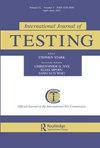运用项目反应理论了解量表情境化的影响:以决策风格量表为例
IF 1.4
Q2 SOCIAL SCIENCES, INTERDISCIPLINARY
引用次数: 1
摘要
摘要本研究的目的是将量表情境化(即参照系效应)的研究扩展到决策风格结构中,比较情境化在三个独特的决策风格量表中的影响,并在项目反应理论框架内检验量表语境化的后果。基于混合实验设计,从661名大学生中收集的数据表明,情境化量表产生了更高的预测有效性,偶尔比原始量表具有更好的心理测量特性,并且情境化的影响在一定程度上是量表特有的。这些发现为寻求修改和调整现有量表的研究人员和从业者提供了重要的见解。本文章由计算机程序翻译,如有差异,请以英文原文为准。
Using item response theory to understand the effects of scale contextualization: An illustration using decision making style scales
Abstract The goal of this study was to extend research on scale contextualization (i.e., frame-of-reference effect) to the decision making styles construct, compare the effects of contextualization across three unique decision style scales, and examine the consequences of scale contextualization within an item response theory framework. Based on a mixed experimental design, data gathered from 661 university students indicated that contextualized scales yielded higher predictive validity, occasionally possessed psychometric properties better than the original measures, and that the effects of contextualization are somewhat scale-specific. These findings provide important insights for researchers and practitioners seeking to modify and adapt existing scales.
求助全文
通过发布文献求助,成功后即可免费获取论文全文。
去求助
来源期刊

International Journal of Testing
SOCIAL SCIENCES, INTERDISCIPLINARY-
CiteScore
3.60
自引率
11.80%
发文量
13
 求助内容:
求助内容: 应助结果提醒方式:
应助结果提醒方式:


